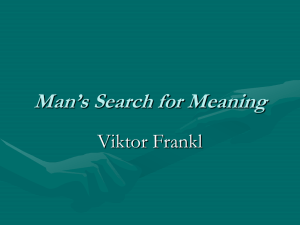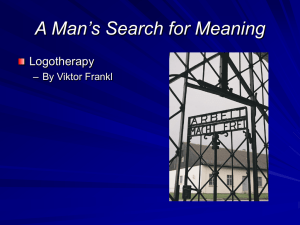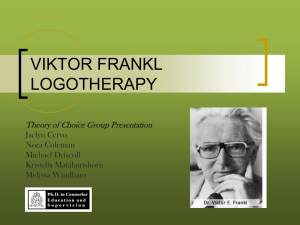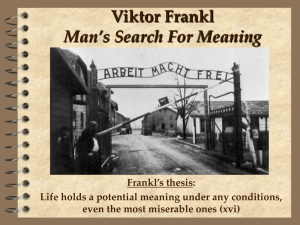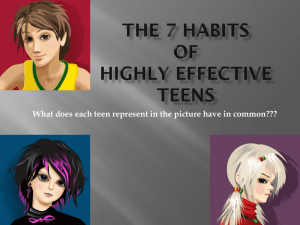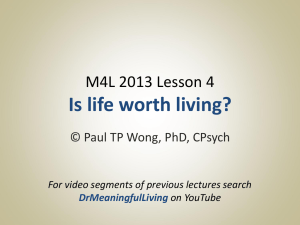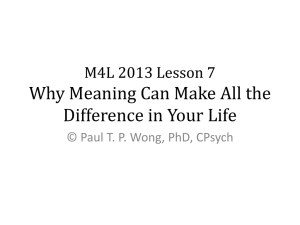Name: Man`s Search for Meaning Reading Guide English IV Man`s
advertisement
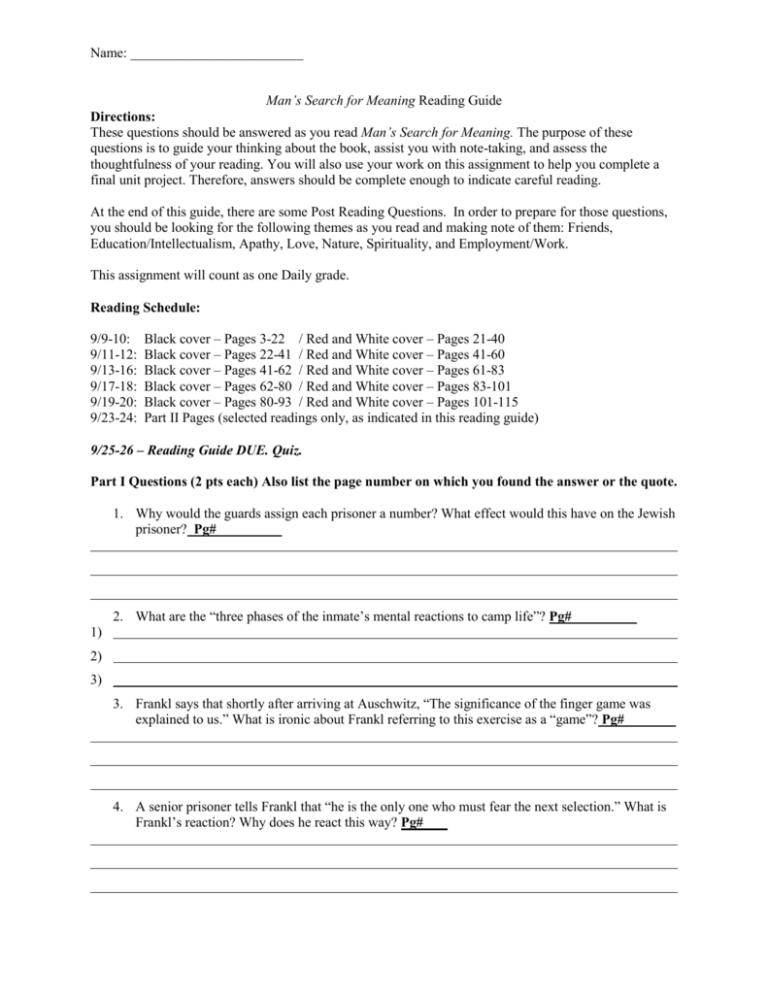
Name: _________________________ Man’s Search for Meaning Reading Guide Directions: These questions should be answered as you read Man’s Search for Meaning. The purpose of these questions is to guide your thinking about the book, assist you with note-taking, and assess the thoughtfulness of your reading. You will also use your work on this assignment to help you complete a final unit project. Therefore, answers should be complete enough to indicate careful reading. At the end of this guide, there are some Post Reading Questions. In order to prepare for those questions, you should be looking for the following themes as you read and making note of them: Friends, Education/Intellectualism, Apathy, Love, Nature, Spirituality, and Employment/Work. This assignment will count as one Daily grade. Reading Schedule: 9/9-10: 9/11-12: 9/13-16: 9/17-18: 9/19-20: 9/23-24: Black cover – Pages 3-22 / Red and White cover – Pages 21-40 Black cover – Pages 22-41 / Red and White cover – Pages 41-60 Black cover – Pages 41-62 / Red and White cover – Pages 61-83 Black cover – Pages 62-80 / Red and White cover – Pages 83-101 Black cover – Pages 80-93 / Red and White cover – Pages 101-115 Part II Pages (selected readings only, as indicated in this reading guide) 9/25-26 – Reading Guide DUE. Quiz. Part I Questions (2 pts each) Also list the page number on which you found the answer or the quote. 1. Why would the guards assign each prisoner a number? What effect would this have on the Jewish prisoner? Pg# _________ 2. What are the “three phases of the inmate’s mental reactions to camp life”? Pg# _________ 1) 2) 3) 3. Frankl says that shortly after arriving at Auschwitz, “The significance of the finger game was explained to us.” What is ironic about Frankl referring to this exercise as a “game”? Pg# _______ 4. A senior prisoner tells Frankl that “he is the only one who must fear the next selection.” What is Frankl’s reaction? Why does he react this way? Pg# ___ English IV Man’s Search for Meaning Reading Guide 5. Frankl quotes Lessing by saying “There are things which must cause you to lose your reason or you have none to lose.” (Note: in this case, “reason” means “sanity.”) What does this quote mean? Give an example of a situation in the book that depicts this idea. Pg# _________ 6. At one point Frankl recounts eating his soup and watching with unconcern as a nurse drags a dead patient’s body out of the typhus hut. How has Frankl’s outlook changed since his arrival at Auschwitz? Choose two words/phrases from this scene that illustrate the change in Frankl’s outlook. Pg# ______ 7. Frankl states that “the most painful part of beatings is the insult which they imply.” Give an example from your life or from contemporary culture that depicts the meaning behind that statement. Pg# ______ 8. Why does the Capo in Frankl’s working party take a liking to him? What three ways does this relationship benefit Frankl? Pg# ___ 1) 2) 3) 9. Frankl brings up the paradox that “some prisoners of a less hardy make-up often seemed to survive camp life better than those of a robust nature.” How does he explain this paradox? What are your thoughts on the paradox? Pg# _________ English IV Man’s Search for Meaning Reading Guide 10. Despite the horrific conditions, Frankl finds meaning in his life at camp. Give a specific example. Pg# _________ 11. “How beautiful the world could be!” – What are the prisoners doing when this statement is made (the context)? How does this scene depict a change in the prisoner’s concept of a meaningful life? Pg# _________ 12. What was the purpose of the cabaret? Pg# _________ 13. Frankl says, “Humor was another of the soul’s weapons in the fight for self-preservation.” Have you ever seen humor used to get through a tough event? Give an example from contemporary life. Pg# _________ 14. Frankl recounts a moment after he has left the camp of being shown a photograph of prisoners in bed. His reaction is the opposite of his friend. Why? Pg# _________ 15. When the chief doctor asks for volunteers for medical duties in another camp containing typhus patients, Frankl volunteers. What reason does he give for volunteering? What does this illustrate about the changes to his concept of a meaningful life? Pg# _________ 16. What is the moral to the story of “Death in Teheran”? Pg# _________ English IV Man’s Search for Meaning Reading Guide 17. At one point Frankl has the opportunity to attempt an escape but he chooses not to. How does his decision illustrate the qualities of life he finds to be meaningful? Pg# _________ 18. Frankl believes that everything can be taken from a man but one thing. What is that thing? Pg# __ 19. Dostoevski said, “There is only one thing that I dread: not to be worthy of my sufferings.” Why does Frankl quote Dostoevski? What is he trying to say to his reader? Pg# _________ 20. Frankl recounts witnessing a young woman’s death. She is cheerful despite knowing that she will soon die. What two meaningful things does she value that gives her this comfort? Pg# _________ 21. Frankl explains the concept of “provisional existence.” What, in your own words, does this term mean? According to Frankl, why do some people living a provisional existence have a meaningful life while others lives become meaningless? Pg# _________ 22. Frankl says that his friend, F___ , the senior warden, died of typhus “to all outward appearances.” This implies that Frankl thinks he died of something else. What does Frankl think killed F___? Pg# _________ 23. A crucial point in the narrative is that “it did not really matter what we expected from life, but rather what life expected from us.” Explain, in your own words, what Frankls’ statement means. Pg# _________ English IV Man’s Search for Meaning Reading Guide 24. Summarize what Frankl tells him comrades to encourage them and dispel their suicidal thoughts. Pg# _________ 25. Frankl describes several psychological symptoms experienced by freed prisoners. For each symptom, explain what Frankl sees as the cause of the symptom. Pg# _________ A) Moral deformity: _____________________________________________________________________________________ _____________________________________________________________________________________ B) Bitterness: _____________________________________________________________________________________ _____________________________________________________________________________________ C) Disillusionment: _____________________________________________________________________________________ _____________________________________________________________________________________ Part II Questions (2 pts each) You are required to read some, but not all, of Part II. The questions for this section are broken down by the heading for the subjects you are required to read. “The Will to Meaning” 26. According to the findings of the John Hopkins survey, what goal is “very important” to most people? Pg# _________ “The Existential Vacuum” 27. Frankl says the existential vacuum is a widespread, modern phenomenon. He attributes this to the loss of what two things? Pg# _________ 28. The existential vacuum manifests itself in what common state of being? Pg# _________ 29. What other common widespread phenomenon are tied to the existential vacuum? Pg# _________ English IV Man’s Search for Meaning Reading Guide “The Meaning of Life” 30. Frankl writes that “each man is questioned by life; and only he can answer to life by answering for his own life; to life he can only respond by being responsible.” This attitude gives each of us a great deal of control over how we view the meaningfulness of our lives, regardless of the circumstances. Think back on Part I. Give a quote or specific text reference that illustrates this attitude. A) Quote or text reference from Part I: Pg# _________ a. Explain the connection between your chosen quote and the quote given in question 30. “The Essence of Existence” 31. In what three ways do most people discover the meaning of their live? Pg# _________ A) B) C) “The Meaning of Love” 32. How does loving someone else help a person understand their own potential? Pg# _________ “The Meaning of Suffering: 33. Frankl acknowledges that we cannot control all of the circumstances in our lives. But what does he say we can change in order to control fate’s impact on the meaningfulness of life? Pg# _____ 34. Does Frankl believe suffering is necessary to find meaning in life? Find a quote to support your answer. Pg# _________ English IV Man’s Search for Meaning Reading Guide Post Reading Questions (4 pts each) 35. Is the meaning of life static, or fluidly changing throughout an individual’s life? A) Your opinion: B) Frankl’s opinion (with a quote from the book to support your answer). Pg# _________ 36. Each of the following themes came up in Man’s Search for Meaning. For each theme, find a quote from the book that reveals the importance Frankl sees in that topic. Note: If you can’t find anything for a given topic, YOU MAY CHOOSE TO SUBSTITUTE A DIFFERENT THEME OF YOUR OWN CHOOSING (i.e. one not offered on this list). Be sure to record the page number with each quote for future reference. A) Friends Pg. ________ B) Education/Intellectualism Pg. ________ C) Apathy Pg. ________ D) Love Pg. ________ English IV Man’s Search for Meaning Reading Guide E) Nature Pg. ________ F) Spirituality Pg. ________ G) Employment/Work Pg. ________
